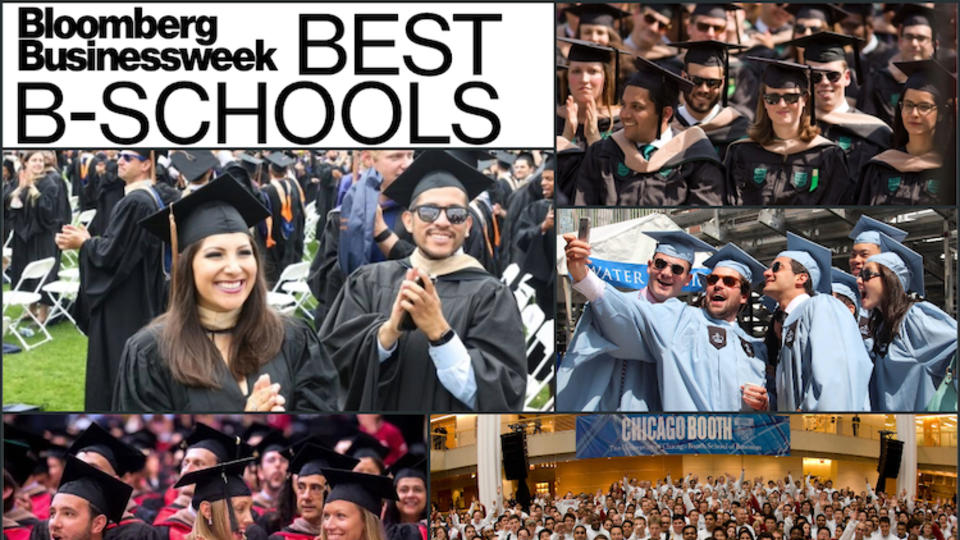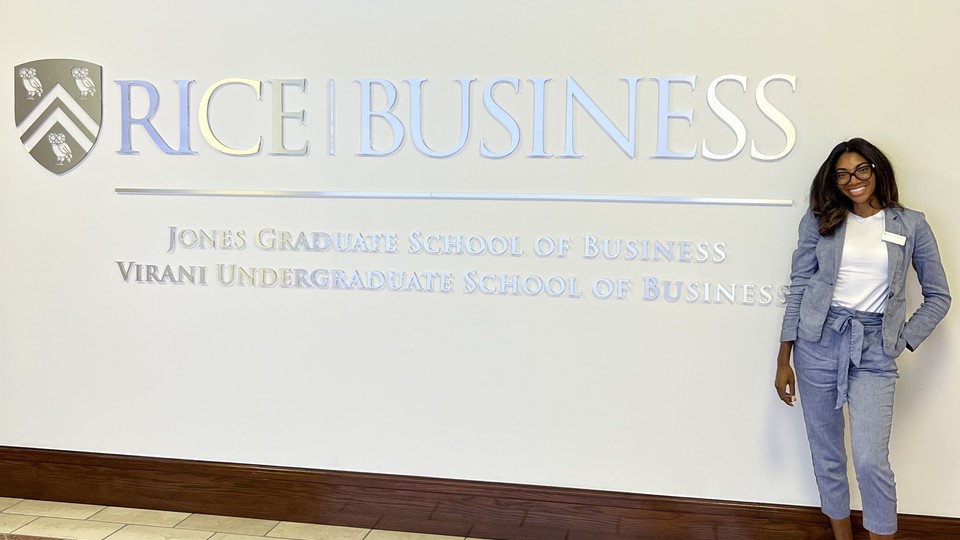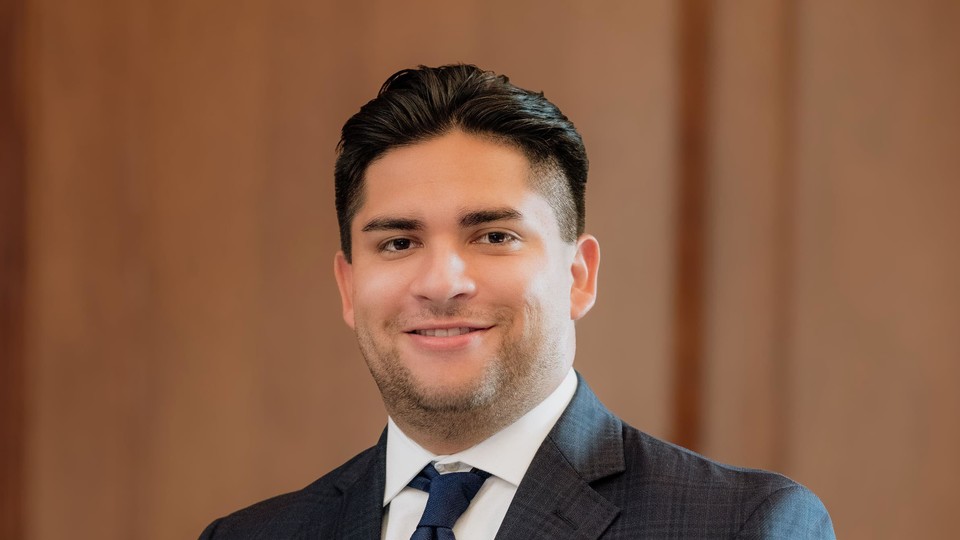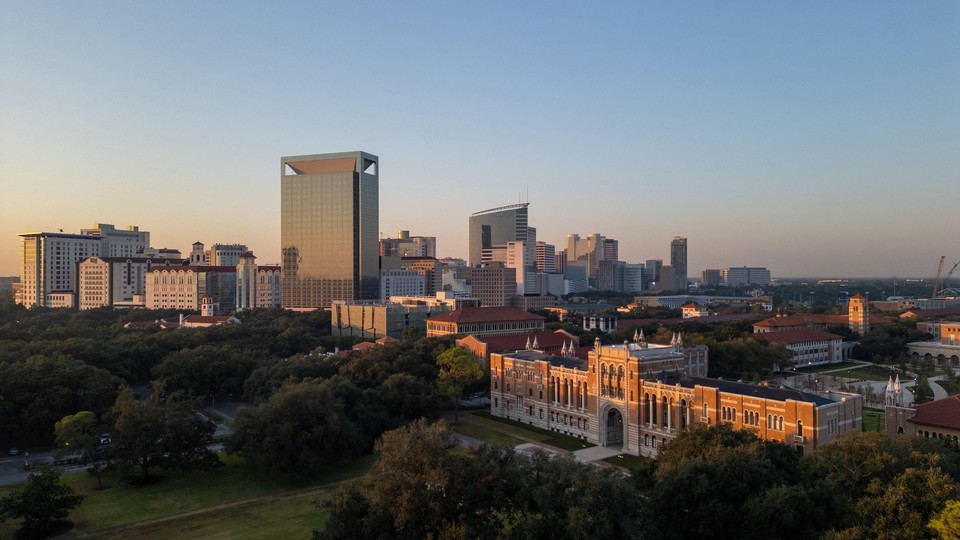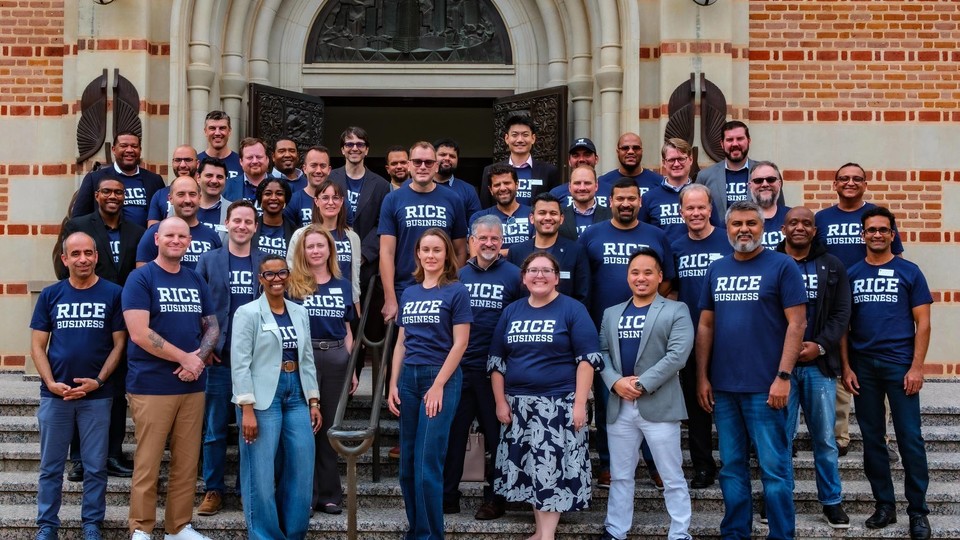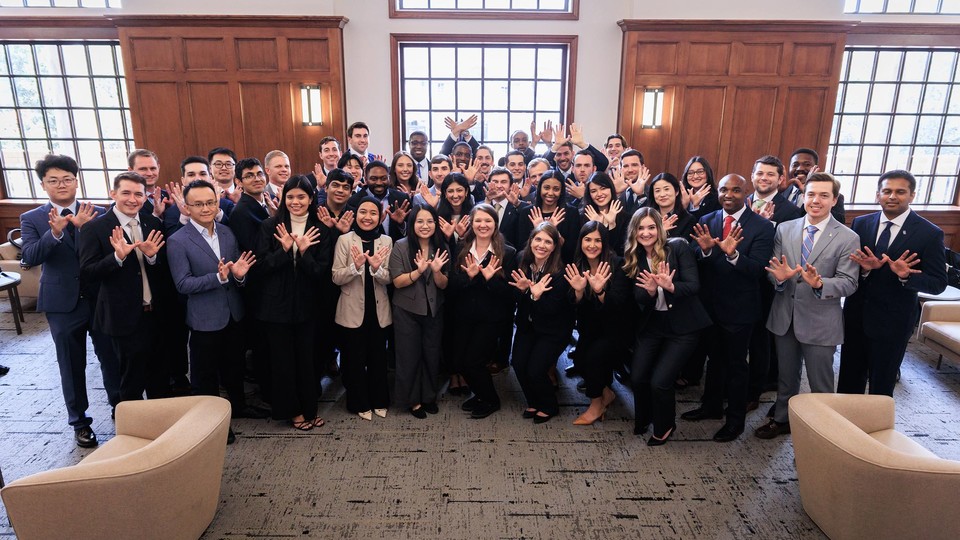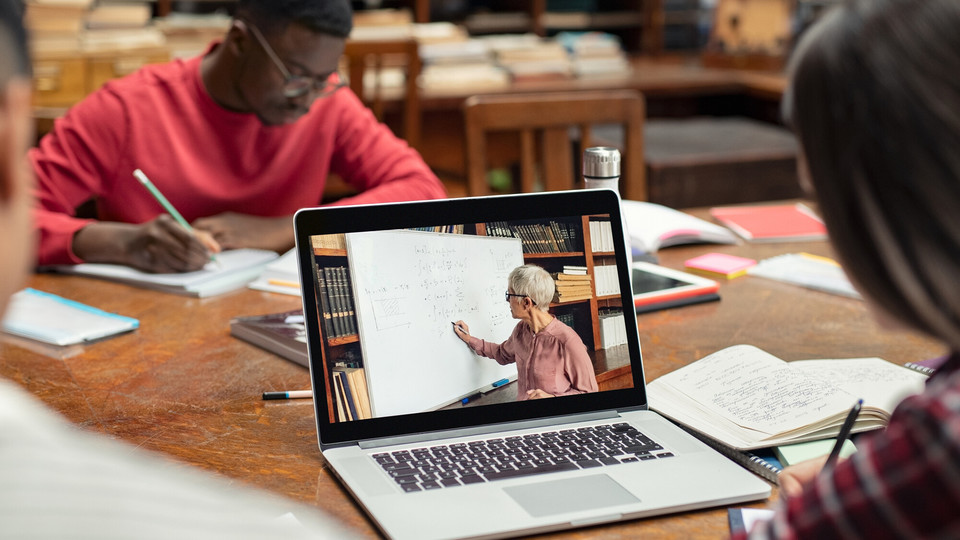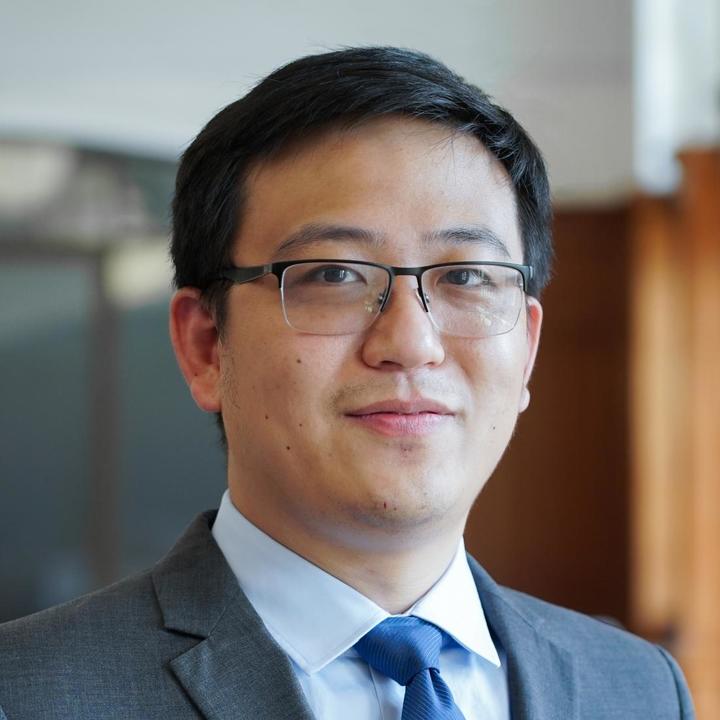How Two Years at Rice Alliance Became 22 feat. Brad Burke
Season 3, Episode 26
Host Maya Pomroy ’22 chats with Brad about transforming the Rice Business Plan Competition into the world's biggest and richest student startup competition, his illustrious career spanning 22 years at Rice, and some of the most memorable competition winners.
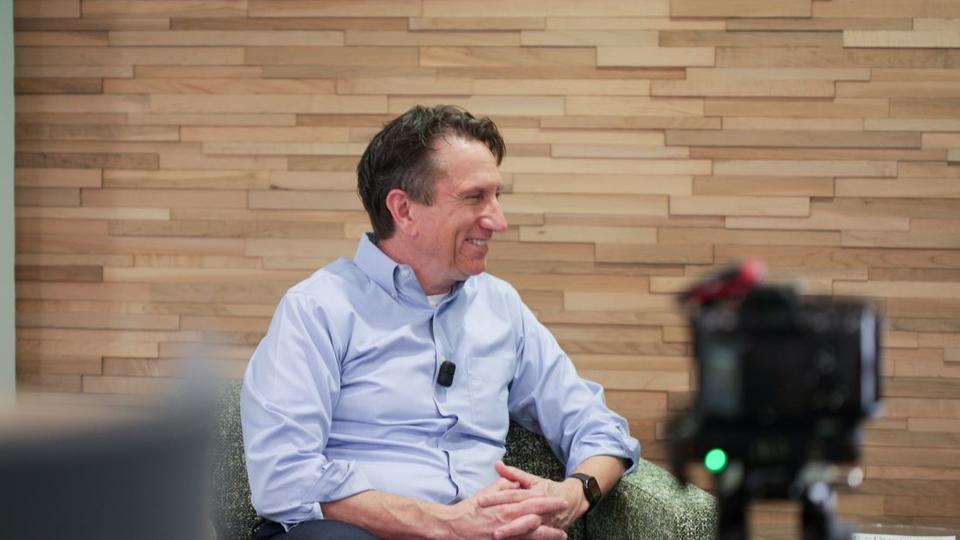
Owl Have You Know
Season 3, Episode 26
For our final episode of season 3, we wanted to bring you one last conversation from this year’s Alumni Reunion.
Brad Burke is the managing director of Rice Alliance, Rice Business’ flagship entrepreneurship initiative launched in 2000. Brad has led Rice Alliance since 2001, helping the Rice Business Plan Competition become the world’s largest and richest student startup competition. Since Rice Alliance’s inception, more than 2,950 tech startups have participated in its programs.
In the Rice Alliance space in McNair Hall, host Maya Pomroy ’22 chats with Brad about his journey to Houston, his illustrious career spanning 22 years at Rice, and some of the most memorable competition winners.
Watch
Listen
Subscribe to Owl Have You Know on Apple Podcasts, Spotify, Youtube or wherever you find your favorite podcasts.
Episode Transcript
-
[00:00] Intro: Welcome to Owl Have You Know, a podcast from Rice Business. This episode is part of our Flight Path series, where guests share their career journeys and stories of the Rice connections that got them where they are.
[00:14] Maya: Welcome to Owl Have You Know. Today, we have a magnificent guest, the managing director of Rice Alliance, Brad Burke. And it's Reunion Weekend. There's a lot of energy. There's all this music outside. There's, like, you know, wine, cheese, food. It's like the best weekend ever to be on campus. So, we want to thank you for being with us here today. And we want to talk about your illustrious career here at Rice. You've been here for 22 years.
[00:39] Brad: 22 years, yes.
[00:39] Maya: The number one graduate entrepreneurship school in the country, right?
[00:45] Brad: Yes. Yeah, it's cool.
[00:45] Maya: So, what a big deal. We talk about that a lot.
[00:47] Brad: Yes.
[00:48] Maya: And you're really a big part of that.
[00:51] Brad: Yeah. Thanks, I appreciate that. Yeah. Cool.
[00:53] Maya: So, let's talk about... because I know you like to talk about Rice a lot, but I would like to talk about you a lot —
[00:58] Brad: Yeah, sure.
[00:59] Maya: ... and know about your story and how you got started and how, I know that you were planning on just staying here for a hot minute at Rice and it turned into 22 years.
[01:08] Brad: It did.
[01:09] Maya: So, tell me, so you're from Memphis.
[01:11] Brad: So, that's right. So, I grew up in Memphis, lived there my whole life, and wanted to go to a college that was somewhere far away, but not too far away from home. So, I went to Vanderbilt, which is in Nashville
[01:18] Maya: In Tennessee.
[01:20] Brad: It was 200 miles away. It was before Nashville became cool. Now, Nashville's, kind of, like Austin.
[01:25] Maya: Yeah.
[01:26] Brad: But it became cool. And so, I went into, went to Vanderbilt, knowing that I was going to become a lawyer. I was pre-law, and I stayed pre-law until I took a finance class my senior year. Fall of the senior year, I had a faculty member who had a great class. And he said, "Look, you should try business schools." And he took a piece of paper, drew, wrote down 10 names, drew a line halfway down, and said, "You should apply to schools that are above the line. And if you end up having to go below the line, come see me."
So, I applied to about three or four business schools. I looked at... I had a... he wrote both Northwestern and Chicago on the list above the line. And I looked at where they were located, Northwestern's in the suburbs, in the lake.
[02:07] Maya: It's cold. It's cold there.
[02:08] Brad: And so, we ended up going to Northwestern, straight from Vanderbilt. I also applied to law schools and got in. I thought about doing a joint program, but ultimately said two years for an MBA, get a higher salary, then you go three years as a law student.
[02:23] Maya: Right.
[02:24] Brad: And business was really what I wanted to do and be in.
[02:27] Maya: And so, Kellogg School.
[02:29] Brad: So, Kellogg. So, to Kellogg.
[02:30] Maya: So, you were a baby MBA, what we call baby MBAs, right?
[02:33] Brad: A baby MBA.
[02:34] Maya: That's, like, an original MBA, and you got the professional, and you got the executive. So, you came in straight.
[02:37] Brad: Full time. Got a full-time MBA, two years. I had no work experience, so I didn't want to even consider, like, a four-quarter program or, you know, a one-year program because I needed a summer internship to get some work under my belt that had some relevance. And so, I went there. And it was a great experience. Now, the first winter I was in Chicago was the coldest winter they'd ever had in Chicago.
[02:59] Maya: Of course.
[02:59] Brad: And it was the snowiest winter they'd ever had.
[03:02] Maya: Uh-huh.
[03:02] Brad: Being a Tennessee kid, I interviewed with every company that came from a warm place. That was the great strategy, right? So, that included Exxon, and so I ended up taking a job with Exxon.
[03:16] Maya: Out of, out of business school?
[03:16] Brad: Out of, out of Kellogg.
[03:18] Maya: Huh, here in Houston?
[03:19] Brad: Well, it would have been Houston, except they said, "What would you think about working in a refinery in Baton Rouge?" And I said, "Well," you know, at that time in my life, I said, "That sounds cool to learn the business."
[03:28] Maya: Right, right.
[03:29] Brad: And so, I was there for three years and then came to Houston after that.
[03:33] Maya: And Exxon brought you to Houston?
[03:34] Brad: Exxon brought me to Houston, that's right.
[03:35] Maya: Okay. So, how long were you at Exxon?
[03:38] Brad: I was there 15 years.
[03:39] Maya: Wow, in finance?
[03:40] Brad: In finance, primarily. I also did sales. I sold lubricant specialty products for a while in a territory that went from Texas to California to Washington and Hawaii and Alaska.
[03:51] Maya: Wow.
[03:52] Brad: Unfortunately, we didn't have enough business to actually go on a business trip to Hawaii.
[03:54] Maya: In Hawaii.
[03:56] Brad: But I had a great territory.
[03:57] Maya: That's where I'd want to go, too. Yeah, that sounds like a great territory.
[03:59] Brad: Yeah. So, I did that, too. So, I did finance and sales and marketing with Exxon.
[04:03] Maya: Okay. And so, you did that for 15 years?
[04:05] Brad: Did that for 15 years. And at 15 years, I was at that point at the international headquarters, international downstream headquarters. My next job would have been overseas. And at that point, I had to say, "Am I going to be an Exxon Lifer or not?" Because if I was going to change jobs, I needed to do it then while I'm still in the U.S. So, I decided to interview with a number of management consulting firms. And I got an offer, and went into... did a transition in management consulting for three years.
[04:36] Maya: Did you like that?
[04:38] Brad: Yes and no. I liked, I liked the travel and all that comes with it. But what I didn't like was not actually being able to implement the recommendations. So, I felt like that they were paying us to develop a recommendation and strategy.
[04:54] Maya: Couldn't follow through.
[04:55] Brad: And they couldn't, and I couldn't, you know, we didn't follow through. And ultimately, most of the companies probably don't... aren't able to successfully follow through. So, I'd rather do things than suggest recommendations for other people to do things.
[05:08] Maya: Right.
[05:09] Brad: And so, I realized that really wasn't my favorite thing.
[05:12] Maya: So, three years.
[05:13] Brad: Three years. And so, this was when the internet was getting started in '90. I went there at '95 and was there through '98.
[05:23] Maya: Wow.
[05:25] Brad: Now, I remember on a... in the middle of that, I remember being on a plane to France on a vacation. And I was like, "What do I really want to do with my life when I grow up?" And the internet came along, was coming along. And I had a second degree at Vanderbilt in computer science, of all things.
[05:40] Maya: You failed to mention that earlier.
[05:42] Brad: I did.
[05:43] Maya: So, two degrees.
[05:43] Brad: A two degree. Well, I had a double major, not two degrees, but a double major in business and computer science.
[05:45] Maya: Okay, double major, okay. Okay.
[05:49] Brad: And I'd always, sort of, wanted to do something in that area. And then, the internet came along. And I was on this flight. I remember being on this flight to Paris in first class because I had enough miles to travel first class to Paris.
[05:59] Maya: Sure. If you have enough miles... I mean, now they're worthless. So, then, they actually like meant something.
[06:05] Brad: Yeah. And so, I was like, "I think I want to get involved in the internet." Well, a person who I worked for in consulting had gone to a startup company, an internet startup company.
[06:15] Maya: What was it called?
[06:15] Brad: It was called Viant, which no one's heard about. But it was a systems integrator, so we developed websites for people. And he said, "Hey, what do you think about coming over to Viant? And so, in '98, I got recruited over to this internet startup company. I was in Dallas at the time. And so, as part of the Dallas office, we were backed by venture capitalists from Silicon Valley. Ultimately, we were like, "Well, when will we go public?" And we went public in '99. So, I joined in '98. A year later, we went public. And the Goldman Sachs took us public, and the stock ran up like all the other dot-com stocks did at that time.
[06:55] Maya: I was going to say the dot-com, yeah.
[06:57] Brad: It went from, you know, $8 to $55. So, we're all happy. And, we were thinking, "We're here, we're here with the long term."
[07:05] Maya: For sure.
[07:05] Brad: Now, we're also watching all the inside trades on Yahoo Finance, and we're seeing that the VCs are all selling once the stock went public.
[07:16] Maya: A bit unnerving. A bit, a bit unnerving.
[07:18] Brad: They're selling the stock. And I didn't understand the VC model at that time.
[07:21] Maya: Right.
[07:22] Brad: I didn't know that we were a home run for the venture capitalists.
[07:25] Maya: Right.
[07:25] Brad: We're all there for the long term and, you know, got to hold our shares for, you know, low. And if we're going to sell it, we're going to wait a year at least to get the capital gains treatment.
[07:33] Maya: That's not the way that the venture capitalists were in.
[07:35] Brad: And they were selling. And we didn't, sort of, understand the picture. And of course, we didn't know what the future held.
[07:41] Maya: Right.
[07:42] Brad: And then, demand for their services dropped off and begin to, kind of, peak in 2000. And then, 2001, the demand dropped off for these services because the dot-com boom was over. And so, in the middle of that I had moved to...
[07:56] Maya: A lot of things happened in 2001, actually.
[07:59] Brad: Yeah, a lot of things.
[08:00] Maya: A lot of, like, pretty, you know, worldly events that happened at the same time.
[08:05] Brad: It did. And I was in Dallas, but I was traveling to Houston every week because Compaq Computer Corporation, which used to be on the north side of of Houston, was our, was our... became our biggest client and the biggest client the firm had.
[08:23] Maya: It was by Halliburton.
[08:24] Brad: Yeah. So, I was here every week, anyway. And so, that I... we convinced the management of the company to open an office here. So, I opened the Houston office of Viant downtown, rented a floor out — 20,000 square feet, five-year lease. And while that was being designed and built out, we had temporary space there. And then, the dot-com boom ended and the space never got built out. We closed the office in 2001. And now, it's not... it was a great ride.
[08:52] Maya: Well, it was a great ride, sure.
[08:55] Brad: It was great ride. Great front row seat to going public, the dot-com boom, and, you know, a little taste of venture capital and startup world. And so, I thought, you know, at that point I had worked for 21 years, never taken a day off, you know, basically, and was going, "I was going to take a year off or so." And then, the founder of the Rice Alliance, who was Steven Currall, Steve Currall, a faculty member here at the Jones School, said, "Hey, I'm looking for somebody to run it, so I can go back to teaching and research."
[09:28] Maya: How'd you meet him?
[09:29] Brad: I met him because we were doing, I was doing marketing and business development, trying to find startups we could sell our work to and we could build websites for.
[09:36] Maya: Uh-huh.
[09:37] Brad: So, I was a, I was a judge at the very first Rice Business Plan Competition, because I am at stake.
[09:42] Maya: Really?
[09:43] Brad: I was a sponsor of the Rice Alliance when I was at Viant until I knew him. And I...
[09:49] Maya: So, you believed in their program.
[09:51] Brad: I believed it. I was a sponsor of it.
[09:54] Maya: Yeah.
[09:54] Brad: And so, I knew him and then I interviewed with it and was lucky that I was fortunate to be selected.
[10:02] Maya: And that was the beginning.
[10:04] Brad: That was the beginning. So, I...
[10:05] Maya: Of this whole place.
[10:06] Brad: In 2001. I joined in the summer of 2001. And I remember having a conversation back to something you said a minute ago. I remember having a conversation with Steve and he said, "Look, if you come on board, will you at least agree to stay for two years?" And I remember thinking in his office, I remember these conversations, like, he and I were about as close together, as you and I are. I remember thinking, "Well, you know, two years is a long time. But okay, I'll stay here two years." And then...
[10:36] Maya: 22 years later —
[10:37] Brad: 22 years later, I'm still here.
[10:38] Maya: We're still here.
[10:39] Brad: Steve got recruited to London in about 2004, 2005. And so, he...
[10:45] Maya: London School of Economics, is that where he went?
[10:47] Brad: He was with University College of London, but he also had a secondary appointment at another university there. And I think it was London School of Economics. And so, he was in London. And so, that was great. From that same point, you know, it was a great move for him and, you know, good for the Rice Alliance as well.
[11:08] Maya: Well, a streamlined transition.
[11:10] Brad: It did.
[11:11] Maya: You know, this is something that you believed in from the very beginning, you know.
[11:12] Brad: Yes.
[11:13] Maya: And so, tell me about how you've grown the Rice Alliance to be what it is today, because it is the number one... when people think of entrepreneurship and when people think of, you know, the Rice Business Plan Competition, it's bigger than Harvard. It's bigger than... I mean, it's the biggest one.
[11:28] Brad: Yeah.
[11:29] Maya: So, how did you, how did you start up that? Because you basically ran a startup.
[11:35] Brad: I did. And in some ways, it still feels like a startup as well. So, I was a judge at the first business plan competition. And we had nine schools that competed for $10,000. Now, so I came on board six months after that first competition. And so, I led the 2002 competition. And I said, "Look, we just got to... let's just say we're going to triple the prize money and see if we can figure out how to raise it." But we tripled the prize money.
[12:01] Maya: It incentivized quite a few additional start-outs.
[12:04] Brad: It did. So, we had 15 schools, I think, 14 or 15 schools compete for $30,000.
[12:10] Maya: The following year.
[12:10] Brad: The second year of the competition. Then, we raised it a little bit more the third year and the fourth year. And finally, in 2005, I looked at some of the other business plan competitions, and what they were doing is they were offering an investment prize for the grand prize winner of $100,000. So, $100,000 investment prize, that would be cool if we could do the same thing.
[12:31] Maya: Or even more.
[12:32] Brad: Or, even more. Well, at the time, I would, yeah. First, I was just happy to get $100,000 yeah.
[12:35] Maya: Think big. You got to think big.
[12:37] Brad: Yeah. Well, the thing was we always had the vision that we wanted to be the biggest. I wanted to be the biggest and baddest and best business plan competition. So, we approached an investor in town, Dr. Jack Gill, who's a well-known successful venture capitalist who was originally from Texas but lived in the West Coast for a long time but then retired from venture capital and came back to Houston.
[13:00] Maya: Why? Why would you leave California?
[13:02] Brad: Well, you know, he's from Texas, originally. And the cost of living, much better. And, you know, I think he might say, you know, the lifestyle is better as well.
[13:11] Maya: Yeah.
[13:12] Brad: So, we approached Jack, and Jack said... I said, "What we want to do is get individuals to put up $100,000 investment prize for the winner." And Jack said, "Yeah, I can do that. And I'll get four friends."
[13:24] Maya: "Of my friends."
[13:25] Brad: "And they'll, we'll have five individuals who agree to put up $20,000 investment each to come up with the first prize." Well, it turns out we ended up with six individuals. We still kept it at $100,000, but we had six individuals, including Rod Canion, the founder of Compaq Computer Corporation. We had Michael Holthaus, a successful entrepreneur from Houston, and three others.
And so we had... in 2005, we had the first 100,000 investment prize. So, our prize money, the total that year was about 200,000.
[13:59] Maya: About 2, yeah.
[14:02] Brad: Now, what happened is that, once this group of individuals did that, then other angel investment groups said, "Hey, maybe we could do the same thing."
[14:12] Maya: It's like the tipping point.
[14:13] Brad: It was.
[14:13] Maya: Malcolm Gladwell's tipping point.
[14:14] Brad: Exactly. It was the catalyst for the competition. And by about 2006, we had the most prize money of any competition. And at the time, kind of, the founder of the competition circuit was UT Austin.
[14:31] Maya: McCombs.
[14:32] Brad: McCombs. They had been running it for a long time. And they had, they were one of the schools that we saw that had this $100,000 prize. But it was put up by a single individual who, after a few years, decided that they didn't want to do that anymore. But the beauty of our model is that, even in the first year, we had six individuals. So, if one of them said, "I'm, you know, I want out," didn't make a problem. It didn't cause a problem.
Now, fast-forward today, we've got about 25 individuals who were involved in sponsoring, investing in the grand prize winner. And the prize now is $350,000 first place.
[15:10] Maya: Wow.
[15:13] Brad: But then, that year, 2005 was the first year, right? So, they said, "We're going to put up... whoever the judges vote on, we'll invest $600,000." But they met with the entrepreneur after the competition and they said, "Hey, we really, kind of, like his idea." And so, instead of investing $100,000 in that first winner, they invested $1.1 million in that winner.
[15:35] Maya: That was probably unexpected.
[15:36] Brad: It was. It was.
[15:38] Maya: I mean, imagine being that winner, you know. What a, what a... I mean, that's earth-changing, I mean, you know.
[15:44] Brad: It was life-changing. It has been life-changing for that individual who I still stay in touch with. And he, ultimately, his company would have failed had it not been for that amount of money and for the advice he got from the members of the group.
[15:59] Maya: This Rice community.
[16:00] Brad: This Rice community. Ultimately, the company sold for over $100 million to Adobe. And so, he had a great outcome and so did the investors, the GOOSE Capital Group that put up the investment money.
[16:10] Maya: Yeah.
[16:12] Brad: And same thing happened in 2006. The team won. They were guaranteed $100,000, but then when they met with the founder of the second company, they said, "We really like this company, so we'll invest more." And ultimately, I think they invested about $6 million in that second company. And that company exited as well, had a good exit as well.
[16:33] Maya: I think, I think that you have just guaranteed that there's going to be significantly more people entering this competition next year. Just by saying, by telling that tidbit of information of, you know, just the belief of the people that really believe in the Rice Alliance, that really believe in the competition, that really believe in the startups and the good that they can do and the way that they can change the world, because that's what it's about.
[16:58] Brad: Well, it's amazing. You have the opportunity to mentor these amazing, bright, enthusiastic, young founders who are generally first-time founders. And then, you have the opportunity to see this innovation benefit society, you know, come to the world. And so, you can see a real impact in what you do.
[17:18] Maya: So, what are some of the ones that stick with you?
[17:22] Brad: Oh, you know, there are a lot of them. The second winner created a device for an 18-wheeler going down the highway, called a trailer tail. And you may see these going down the highway. So, what he figured out was, a trailer, an 18-wheeler going down the highway, is like the least aerodynamic thing that you could think of. It's a box with a truck in front pulling it. But what it does, it creates a suction in the back. And so, that suction creates drag.
So, he created a device that would go on the back end of an 18-wheeler, on the back of the trailer, that would improve fuel efficiency by something between 5 and 8%.
[18:06] Maya: Wow.
[18:07] Brad: And it's billions of gallons of gasoline, of diesel, billions of gallons a year.
[18:12] Maya: So, how did he come up with that idea? I'm just curious. Was he just driving down the road or did he have a background in this?
[18:17] Brad: He didn't have a background, but I think he learned of a faculty member who had done research in this and around aerodynamics.
[18:26] Maya: And physics. I mean, that's...
[18:26] Brad: It should have been with that. Yeah. Exactly. And he was able to take that technology and then get some data that say, "Yeah, that really does work." And so, then he developed that company.
[18:36] Maya: It's amazing. What else?
[18:37] Brad: Yeah, it's very cool.
[18:38] Maya: Tell me, tell me about another one.
[18:40] Brad: Well, you know, one that... the individual that I like a lot is a student from Brigham Young University created... this was back in, probably, 14 years ago or so, 15 years ago. Created an app to scan QR codes.
[18:56] Maya: It's my favorite thing in the whole wide world.
[18:58] Brad: Oh, well, back then... it's commonplace now, right?
[19:01] Maya: Yeah.
[19:02] Brad: Almost every app can scan a QR code.
[19:03] Maya: But I mean, that's really, like, life-changing for me because that way... I mean, because I... well, because I serve on a lot of nonprofit boards. And in order to get folks to, you know, to donate, like, listen, just put a QR code on all of, all of your marketing material. And when you go to a luncheon or when you go to an event, the QR code with their phone, because nobody wants to take out their credit card. Nobody wants. That's too much effort. Just simplify people's lives and give them their time back. If you can figure out a way to give somebody back their time, that's the most precious natural resource.
[19:33] Brad: So, in the early days of the QR codes, he created one of the first most popular apps to scan QR codes, when you couldn't just do it on phone camera.
[19:41] Maya: Yeah.
[19:41] Brad: So, he created this app. He had something like in the first couple of weeks, 36 million downloads of this app. He was on Shark Tank, and I don't think he got investment from the Sharks at that time because they said his company was overvalued too much. But it drove demand for his app.
[19:57] Maya: What did they know?
[19:59] Brad: What did they know? Exactly. Exactly. And they made a big mistake because, ultimately, he raised about $9 million of investment, which he didn't really need all that money, but he probably raised more than he needed. And then, he had an exit. But his exit was private, was not disclosed. But I got a call one day from one of the investors from Houston. And he said, "Hey, did you see that? Did you read about this company? The company was called Scan." And I said, "No, tell me about it." Well, getting on the web, and it turns out that... now, here's a convoluted way to get around to this. When the movie comedy, the interview came out, it was about North Korea. And the North Koreans didn't like that movie, and it was put out, I think by Sony.
[20:45] Maya: Shocking.
[20:46] Brad: They hacked into Sony's web servers. And as a result, some of the emails that were confidential got disclosed. One of the emails that got disclosed was from an executive at Snapchat to an executive at Sony. And it said, "Hey, we're not going to disclose this, but we had just acquired Scan for $54 million."
[21:11] Maya: Wow.
[21:12] Brad: So, if you'd invested in this company, you would have done really well. But people, most people didn't.
[21:19] Maya: Right.
[21:19] Brad: And he didn't do that well at the competition because people said, "Well, that's just an app to scan QR codes."
[21:24] Maya: Well, it's the, it's the most basic thing that people don't really think. It's a chess game, right? And I think that, a lot of times, there's people with phenomenal ideas, and they get rejected over and over and over again. And it's, and, you know what, like, the light bulb that failed a couple of... 1,000, over 1,000 times.
[21:42] Brad: He said, he said he... one day, one of his stories was he was having a meeting with a VC on Sand Hill Road, which is where all the VCs are in Silicon Valley. And he said, "I got there early. And so, I just decided to walk up and down the road and knock on VC doors." And I said, "Well, I'll try to talk my way into it." Now, he says, "I tried to talk my way into about 10 different VCs," and he never got past the gatekeeper on any of them.
So, he didn't even get in. And the VC that he talked to had no interest in investing. So, his investment came from other places. But this guy, this changed his life because he sold his company for a lot of money. And then, he said, "Look, what I want to do is travel." And so, he created what he's branded as The Bucket List Family. And so, prior to COVID, he spent about four years traveling every week to a different place, posting a video about that location that he's in. And then, he brought... taking his kids with him, too. So, now, he has three young kids. And they've traveled all over the world. And basically, I said, "Well, you know, so you're using the money that you earned, right?" He said, "No." They figured out a model that allows to monetize —
[22:53] Maya: To monetize that.
[22:53] Brad: ... his adventure travel.
[22:57] Maya: Could you share that with me? Because I would really like that. That would be, that would be ideal. I could, you could just give me his number. I'll give him a call, figure it out, because that's brilliant. Okay. So, what is the future for the Rice Alliance? Where are we going next?
[23:13] Brad: Well, it's a, it's a, it's a number of things. I mean, one is the business plan competition has continued to get bigger. So, I said we started with nine teams. We now have 42 teams. Last year, at the end of the banquet, we were at... the total prize money was $2 million, the highest ever. But that wasn't all because the same thing that happened back in 2005 happened last year. So, the group that put up the grand prize, after they, again, met with the company, they said, "We really like this." So, they put in $1.5 million in last year's winner. But they led around... the total round was about $5.5 million. So, the winner of our competition last year got $5.5 million, led by investors from Houston.
[23:57] Maya: Wow.
[23:57] Brad: And in total, the GOOSE Capital Group has invested $27 million in business plan competition winners. So, way more.
[24:07] Maya: Yes, it's just becoming a really big VC place, you know, I mean, more so than Austin.
[24:13] Brad: Well, there's a lot. Especially, angel investors who want to give back and support entrepreneurs. A group of judges saw what the GOOSE Capital Group was doing, and they got together and said, "Hey, we can do the same thing." So, a group of... we have 275 judges at the competition. A group of them came to me at the end of the banquet and said, "Look, hey, we can do the same thing the GOOSE can, but, you know, we won't invest each as much." And so, led by a Rice alum, who is a West Coast venture capitalist, has organized a group called the Owl Investment Group. Every year, they put up an investment prize. And they have now invested over $5 million in business plan competition teams, way more than the, you know, they initially, you know, signed up to do. So, this competition has —
[24:59] Maya: Growing exponentially.
[25:00] Brad: ... mobilized a number of individuals who really weren't doing angel investment before.
[25:06] Maya: Right.
[25:07] Brad: And now, they're doing, not just investment in the business plan competition, but they're investing in companies from Houston as well.
[25:13] Maya: Right. And Houston is now becoming, you know, this with the Ion and everything else, I mean, it's really becoming the place to be, which is also exciting. And to be just right down the street, and Rice is very much involved with the Ion, and, you know, you've got the medical center right here, and it's exciting times to be at Rice.
[25:31] Brad: It's a great time to be at Rice.
[25:31] Maya: And it's exciting time to be in Houston.
[25:33] Brad: We launched... about 11 years ago, we launched a accelerator for students in the summer called the OwlSpark Accelerator. The initial idea, you know, wasn't a particularly novel idea, but it was started by four students at Rice. And one of the students, an MBA student, deferred his McKenzie full-time career so he could run it the first year.
[25:58] Maya: Wow.
[25:58] Brad: So, he ran it the first year, and then we took it over in year two. And so, we've completed 11 years of the OwlSpark Accelerator, I think 10 or 11 years. We've had 77 or so startups that have gone through it, and they've raised over $100 million in that time.
[26:12] Maya: Amazing.
[26:14] Brad: And then, last summer... so, those are for tech startups. Last summer, we started a second accelerator if you have a small business — a consumer product business, a non-traditionally VC backable business.
[26:25] Maya: Right.
[26:25] Brad: And so, last year, we started the first cohort of what we call the BlueLaunch Accelerator. And it is for consumer products and other startups.
[26:33] Maya: I did those e-mails.
[26:35] Brad: Yeah. So, so we expanded to a second. So, we cover those individuals who want to start a company, but it's not a high-tech company and it's not going to get, likely not going to get venture capital.
[26:47] Maya: But really creating opportunities for all of those that really want to get involved.
[26:52] Brad: Yes.
[26:53] Maya: You know, this is, this is the Mecca.
[26:54] Brad: So, if you have, like, you come to Rice to come to school or you come to get your MBA, if you have an interest in learning about entrepreneurship or getting into entrepreneurship, there's so many things, programs that you can get into, like OwlSpark or BlueLaunch, where you can, with low risk, you can for three months work on your company and decide, is this something that really has legs and that I want to stay with? And so, it's very, it's very cool.
[27:19] Maya: Well, it's... what are you the most looking forward to? What's for the next year? What are you excited about the most? Last question, and then I'll leave you alone.
[27:27] Brad: Oh, okay. What is, what is really huge right now and the momentum is behind the energy transition in Houston. All of the oil and gas, major oil and gas companies, you know, traditionally are, you know, they, 10 years ago, were focused on, how do we produce more oil, how do we produce it more efficiently? They have all now embraced that we're entering this energy transition period, where we'll have both oil and gas and we'll have renewable and sustainable fuels. Ultimately, that's the long term.
[27:56] Maya: Right.
[27:56] Brad: And we're in this period of time.
[27:57] Maya: Well, nuclear fusion as well.
[27:58] Brad: Exactly, exactly. That may be, that in fact may be the answer.
[28:03] Maya: Agreed.
[28:03] Brad: But we are in this period. So, we launched a Clean Energy Accelerator two years ago, and we're about to start. We're evaluating the applicants for the third cohort of the Clean Energy Accelerator. And part of the reason is we're attracting startups from all over the U.S. and outside the U.S. to come through the accelerator with a... you know, we want to help them be more successful, but we also want to show them what's going on in Houston, what they have at the Ion, and what they have at other places in Houston, so that they think about starting a company here, or moving here, or at least opening an office here.
[28:40] Maya: Right.
[28:41] Brad: And we also want to show the investors in Houston really promising clean energy technologies. And so, it gives investors in Houston, like, an early look at some of these promising technologies. So, Houston, I think, has the ability. And we've been the energy capital of the world. We have the ability to be the energy transition capital of the world, because we have the knowledge, the expertise, the resources here. And almost every major energy investor knows about Houston and is aware of it and has a presence here. So, I think it's going to be transformative for the city.
[29:14] Maya: And it all starts here. It's where you belong, right?
[29:18] Brad: Right.
[29:19] Maya: Rice is where you belong. Thank you, Brad. It's been a pleasure to talk with you and to learn about your story. I think that there's many that know about the Rice Alliance, but, you know, you're very humble and you don't really talk much about yourself. So, thank you for sharing all that with us.
[29:32] Brad: Thanks. I appreciate it.
[29:34] Maya: Sure.
Thanks for listening. This has been Owl Have You Know, a production of Rice Business. You can find more information about our guests, hosts, and announcements on our website, business.rice.edu. Please subscribe and leave a rating wherever you find your favorite podcasts. We'd love to hear what you think. The hosts of Owl Have You Know are myself, Maya Pomroy, and Scott Gale.
You May Also Like
Get to Know Iman Basha, a Student in the Inaugural Hybrid MBA Program's Cohort
Meet Iman Basha, hybrid MBA Class of 2025, who has had a clear vision of her MBA pursuit since undergrad and intends to integrate her industry experience into her learning in the classroom.
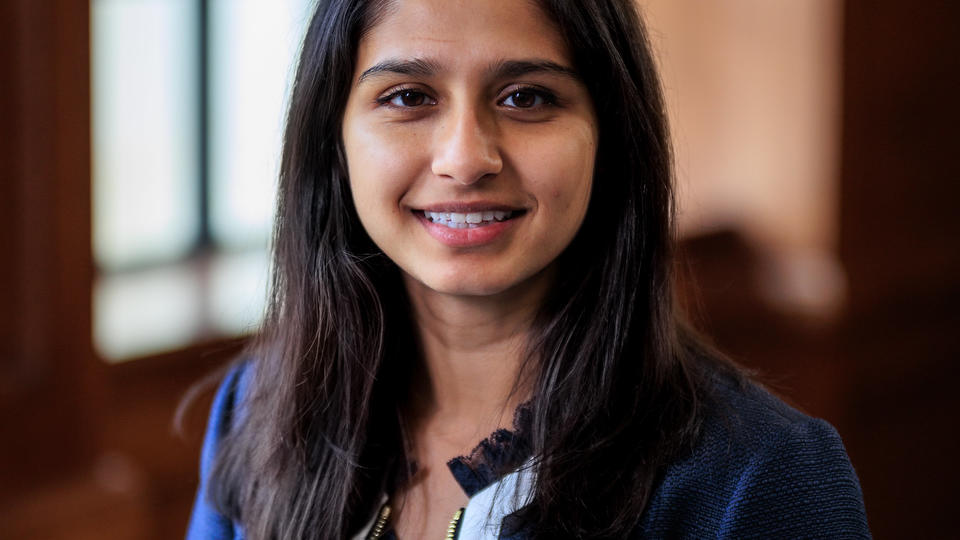
Introducing Iman Basha, Hybrid MBA Class of 2025, who chose Rice Business because of the program's perfect fit with her personal and professional life as a wife and mother. During her selection process she prioritized strong company recruiting, an accessible alumni network, and a relevant curriculum to match the prestige of a top-ranked business school. Iman is located in Houston, TX and works as a consultant. “If you’re looking for a challenge with flexibility, networking, and some of the best professors in the country, you should go for it,” she says. Learn more about Iman and why Rice Business is ideal for her.
Why did you select Rice Business and why did you choose the Hybrid MBA program?
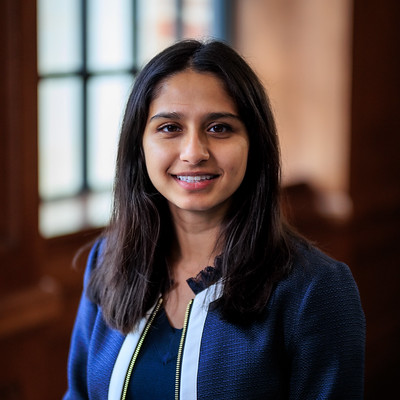
As a dedicated full-time working mother of two, I've found that committing to extended periods of immersion works best for disconnecting from my other responsibilities. Also, given my husband's military service and the potential for relocations, a hybrid learning approach was the perfect solution.
How did you prepare for business school?
Since undergrad, I have had a clear vision of pursuing business school once I gained enough industry experience to integrate into the classroom. The bulk of my preparation was identifying and then applying to programs that fit with what I wanted out of my business school experience — for me that was a strong alumni and recruitment network, a schedule that works with my current responsibilities, having an in-person component, and prestige. The Rice Hybrid MBA program is the perfect fit.
What do you most look forward to as an MBA student?
I’m pretty blown away by the faculty. Every professor in this program presents the material in such an interesting manner. I really find the classes engaging and thought-provoking.
Can you describe your professional goals after Rice Business?
I want to keep an open mind, but I love working for my current company and want to continue growing in consulting. I love helping companies optimize and work through difficult problems.
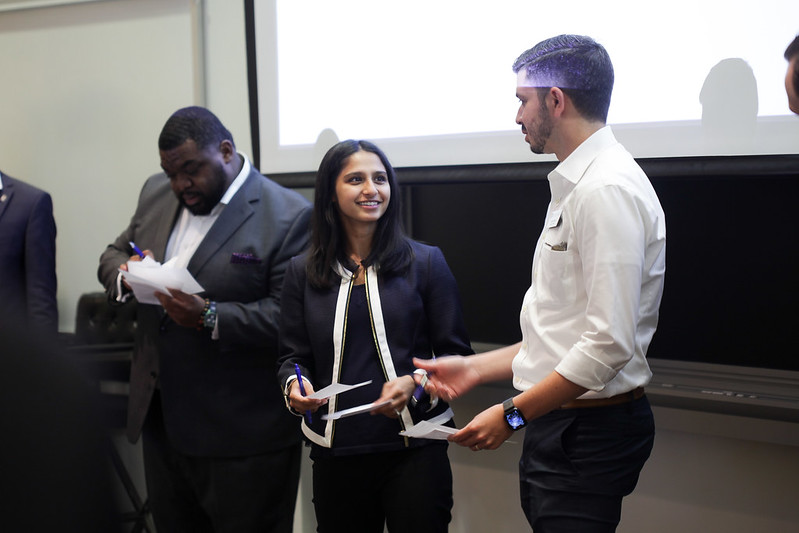
What advice would you give to someone applying to the Hybrid MBA program?
If you’re looking for a challenge with flexibility, networking, and some of the best professors in the country, you should go for it! I feel at home here at Rice Business, even if my “home” is 1000 miles away. We have students that come from all over the country (and even internationally). It’s an incredible opportunity to be a part of this program, where you can build skills, friendships, and memories that will propel us into the workforce with momentum and confidence.
Interested in Rice Business?
2 Houston universities score big for patents, MBA programs
Two new rankings have put the University of Houston and Rice University in the academic limelight. Rice Business climbed 10 spots — to No. 19 — in Bloomberg Businessweek’s 2023-24 ranking of full-time MBA programs. Rice holds the No. 1 spot among Texas programs.
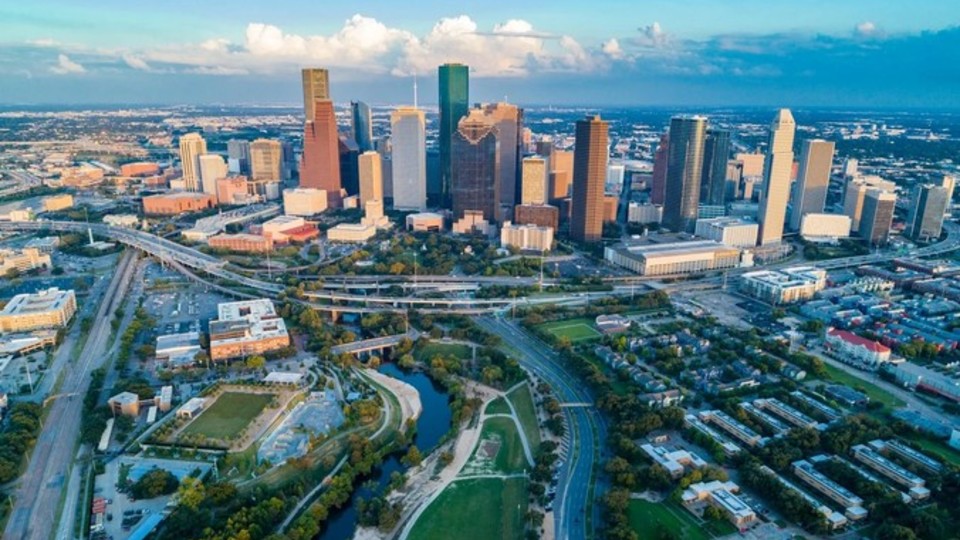
Five-Year Anniversary for MBA@Rice
Celebrating 5 years since its launch, MBA@Rice has become the fastest growing Rice Business program.
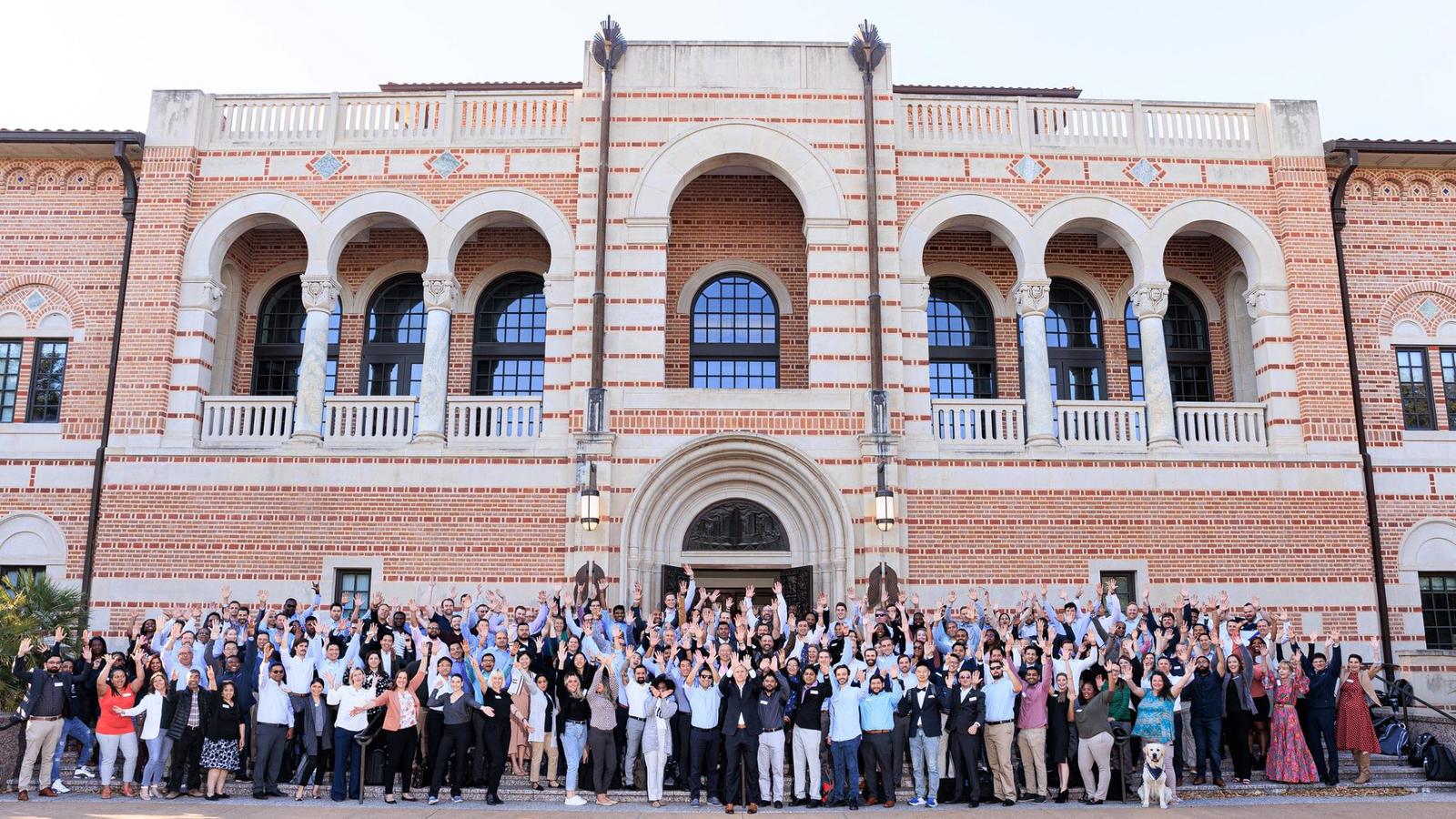
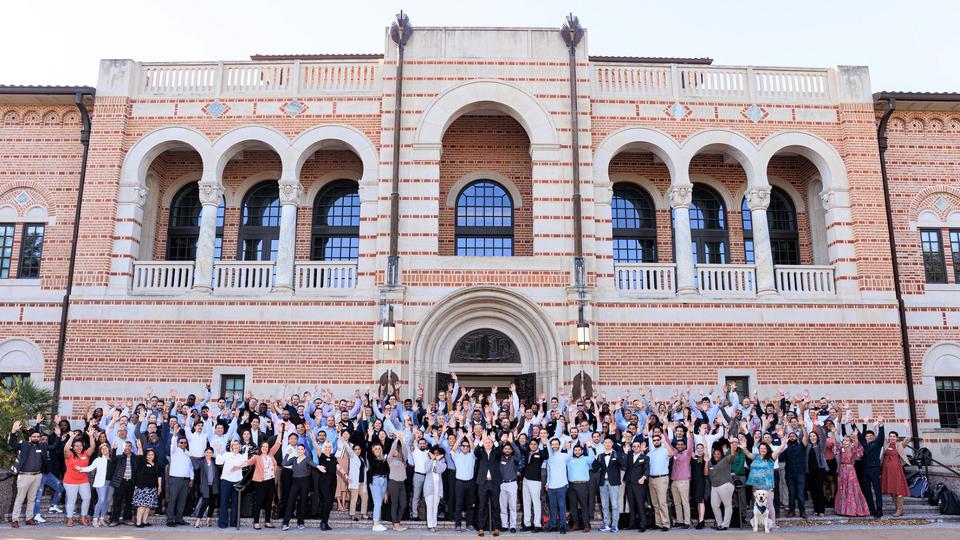
It’s hard to believe MBA@Rice, our online MBA program, is celebrating five years since welcoming its first students. From the time it launched in July 2018, it has become the fastest growing program at Rice Business — a pretty impressive accomplishment considering our full-time MBA added another cohort during COVID.
Ranked No. 12 for online programs by U.S. News and top 5 for online programs by Princeton Review and Poets & Quants, MBA@Rice is recognized for its rigor and service to students. That’s due to staff and faculty working hard behind the scenes to make it thrive, improve student satisfaction and keep the feel as seamless as the on-campus programs.
Of the currently enrolled students, 25% are outside of Texas and 24% are veterans. The program’s success has also allowed Rice Business to grow its tenure-track faculty by 40%.
Interested in Rice Business?
The online MBA has grown our overall enrollment. Students and alumni from the program also engage in the life of the school while securing promotions at work and transitioning to new positions in different industries. For instance, one student was promoted from business development engineer to strategic account manager during the program and has since been promoted to project development manager. Several other graduates have switched careers — from oil and gas to consulting or tech. There are remarkable stories such as a student who pivoted from sales engineer to finance, and another graduate who transitioned from being an actress in musical theater in New York City to a consultant with Accenture.
Alumnus Brian Jackson ’21 is another success story. He hails from Boston via the MBA@Rice program and was named the newest alumni board president, the first online alum in that role. As Brian and so many other graduates prove, our online MBA program broadens our school’s reach and impact, which has been our intention from the beginning.
As we celebrate five years of success and innovation, MBA@Rice continues to stand out as a leader among Online MBA programs. With comprehensive career services for the Online MBA, we're not just committed to your education, we're invested in your entire career journey.
Happy 5-year anniversary, MBA@Rice. We're so happy you're a part of the family.
Barbara Bennett is senior associate dean of degree programs and associate professor of finance and statistics.
You May Also Like
Keep Exploring
Rice to host ‘Go! ENTREPRENEUR TOUR Experience’ with Damon Dash Sept. 23
Rice University’s Center for Engaged Research and Collaborative Learning (CERCL) is partnering with DiverseCiti Houston to celebrate the influence and impact that 50 years of hip-hop has made on the world of business and entrepreneurship. The Go! ENTREPRENEUR Experience P.O.M - P.O.M Lifestyle Tour featuring New York hip-hop entrepreneur and record executive Damon Dash kicks off Sept. 23 in the Shell Auditorium of McNair Hall.
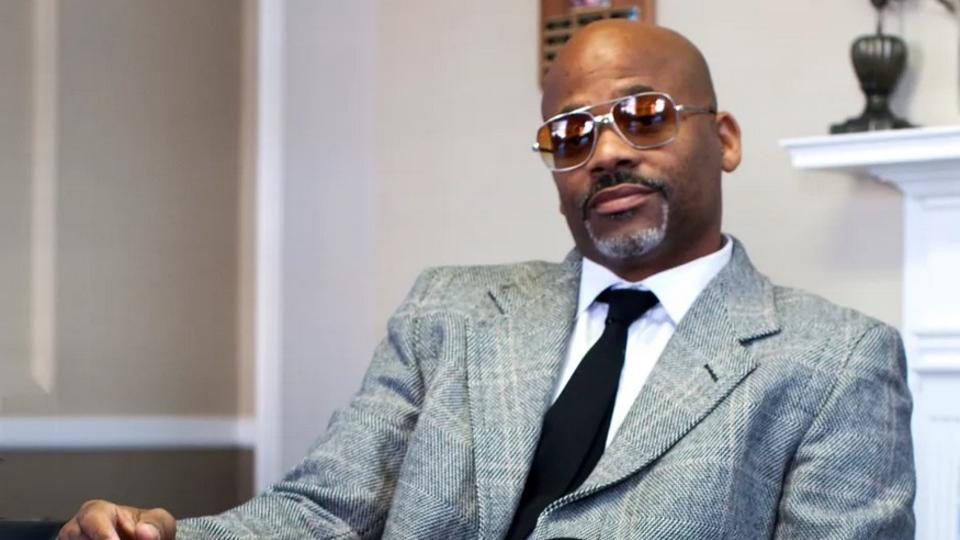

Rice University’s Center for Engaged Research and Collaborative Learning (CERCL) is partnering with DiverseCiti Houston to celebrate the influence and impact that 50 years of hip-hop has made on the world of business and entrepreneurship.
The Go! ENTREPRENEUR Experience P.O.M - P.O.M Lifestyle Tour featuring New York hip-hop entrepreneur and record executive Damon Dash kicks off Sept. 23 at Rice.
The lecture series is part of a tour DiverseCiti has arranged that will visit multiple cities. In Houston, CERCL is the host sponsor along with the Rice Alliance for Technology and Entrepreneurship and the Jones Graduate School of Business’ Office for Diversity, Equity and Inclusion. During Dash's visit, an oral history interview will be conducted for CERCL’s hip-hop archive that is housed in the Fondren Library's Woodson Research Center.
The primary aim of the event is to provide aspiring entrepreneurs, college students, hip-hop enthusiasts and artists with a learning experience from one of the industry’s most accomplished visionaries, while also offering an opportunity for meaningful engagement with diverse business leaders and startups in Houston, according to event organizers.
Dash, hailed as a "disruptive entrepreneur" by Forbes Magazine, has left his mark on the world of business and entertainment. He is CEO of Dash Films, a co-founder of Roc-A-Fella Records and Rocawear and CEO of the production company Dame Dash Studios.
The event will have three panels that include hip-hop pioneers and local entrepreneursMarcus Bowers, co-founder and owner of She’s Happy Hair; Steve Rogers, owner of BAR 5015 and Almeda Hospitality Group; Jacqueline Beauchamp, co-founder and CEO of Engaged Media; Benaisha Poole Watson, the first Afro-Latina to own a FDIC bank; and DJ the Money Coach, CEO of Deransburg International P.O.M – P.O.M. Lifestyle Movement.
For more information, visit https://events.rice.edu/event/352021-the-go-entrepreneur-tour-experience-with-damon.
You May Also Like

Rice University’s Jesse H. Jones Graduate School of Business today announced the launch of its Graduate Certificate in Healthcare Management program, a 10-month, credit-bearing professional credential designed for current and aspiring leaders seeking deep expertise in the business of healthcare.
Houston MBA programs see significant improvement on Bloomberg Businessweek's 2023-24 rankings
“Rising in the rankings for networking and diversity shows how Rice’s faculty and staff are dedicated to creating an entire environment and ecosystem that benefits our students, not just what happens inside the classroom,” Rice Business Dean Peter Rodriguez said. “I am especially proud of these metrics that highlight Rice’s ability to bring people together.”
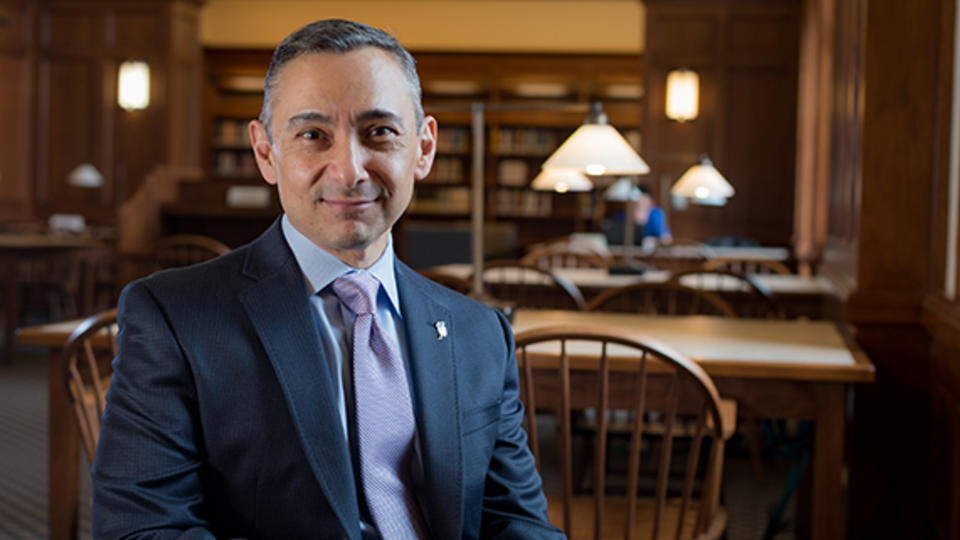
Closing the Racial Refinancing Gap
How federal monetary policy can influence equity (and inequity) in home buying.


Based on research by David Hao Zhang (Rice Business), Kristopher Gerardi (Federal Reserve Bank of Atlanta), and Paul S. Willen (Federal Reserve Bank of Boston)
Key findings:
- White and Asian homebuyers are more likely to refinance their mortgages than Black and Hispanic homebuyers, especially in response to overall market changes.
- The fact that Black and Hispanic homebuyers are less likely to refinance (and face barriers to some refinancing options) costs them $812 million in extra annual interest payments.
- Race-neutral policies could help close this gap.
Black and Hispanic homeowners pay significantly higher mortgage interest rates than white and Asian homeowners.
In part, the difference can be explained by factors like the borrower’s credit score, pre-existing debt and whether they faced racial bias when requesting a loan. However, controlling for these factors only slightly reduces the difference in interest rates. So why are paid interest rates so much higher for Black and Hispanic borrowers?
According to Rice Business professor David Hao Zhang, along with Kristopher Gerardi of the Federal Reserve Bank of Atlanta, and Paul S. Willen of the Federal Reserve Bank of Boston, the difference actually lies in refinancing.
Their new study, published in the Journal of Financial Economics, shows that white and Asian borrowers are more likely to refinance than Black and Hispanic borrowers, especially in response to macroeconomic factors such as falling interest rates. According to the findings, this difference in refinancing behavior is the most significant determinant in the higher interest rates that Black and Hispanic borrowers pay.
To measure how large the interest rate gap is, the study looked at a nationally representative sample of loans originated from 2005 through 2015. The loans were for 30-year fixed mortgages, and they included both Federal Housing Administration (FHA) loans and loans from government-sponsored enterprises (GSEs) such as Fannie Mae and Freddie Mac. The study also looked at borrowers’ credit scores, noting that the FHA program is characterized mostly by first-time homebuyers with low income and low credit scores.
To get to the key factor causing the gap in interest rates, the study controlled for several characteristics that might contribute to differences in interest rates at the start of a loan. Before these controls, refinancing rates for white and Asian borrowers were similar, while Black and Hispanic borrowers were less likely to refinance. After the controls, for both GSE and FHA loans, the gap in refinancing rates between white borrowers and Black borrowers decreased significantly.
Zhang, Gerardi, and Willen also looked at the effect of monetary policy on the racial interest rate gap. In November 2008, the federal government announced a plan for a large-scale buyback of mortgage-backed securities, in order to drive down interest rates. The researchers compared refinancing rates during the six months before and the six months following this announcement.
Although the buyback benefited Black and Hispanic homebuyers somewhat, expansionary monetary policy leading to lower interest rates disproportionately benefited white borrowers and exacerbated mortgage rate inequality, according to the study. The probability that white borrowers would refinance their loans increased by 3.2 percentage points (per quarter) after the announcement, compared with an increase of only 1 percentage point for Black borrowers. This led to rates paid by white borrowers dropping significantly after November 2008. Rates paid by Black and Hispanic borrowers also declined, but by much less.
The problem was compounded by the fact that white borrowers appeared to have a stronger response to changes in market rates. For example, in 2006 and 2007, Black and white borrowers refinanced at around the same rate. In 2009 and 2010, after the recession, white borrowers were twice as likely as Black borrowers to refinance. According to the study, Black borrowers were more likely to hold onto higher-than-market interest rates, and held onto these rates for a longer time. The differences didn’t level off until around the second quarter of 2013.
Zhang, Gerardi, and Willem argue that because most of the racial refinancing gap can be explained by observable differences, race-neutral policies may be effective at closing this gap. They provide examples such as expanding the use of adjustable-rate mortgages or encouraging the use of fixed-rate mortgages with prepayment penalties.
Recently, partly in order to close this gap, the Federal Housing Finance Agency implemented new rules to raise mortgage fees for homebuyers with high credit scores, and to lower fees for homebuyers with lower credit scores. No matter the method used, the study shines a light on an opportunity to create more equity in personal finance by closing the racial refinancing gap.
Zhang, et al. (2023). “Mortgage Prepayment, Race, and Monetary Policy,” Journal of Financial Economics.
Never Miss A Story
You May Also Like
Keep Exploring
Rice Business rises in MBA rankings
Rice University’s Jones Graduate School of Business jumped ten spots to No. 19 on Bloomberg Businessweek’s full-time MBA ranking for 2023-24. The ranking places the Rice Business program as the top in Texas and among the nation’s most distinguished, including those at universities such as Yale, Carnegie Mellon, Harvard and the Massachusetts Institute of Technology.
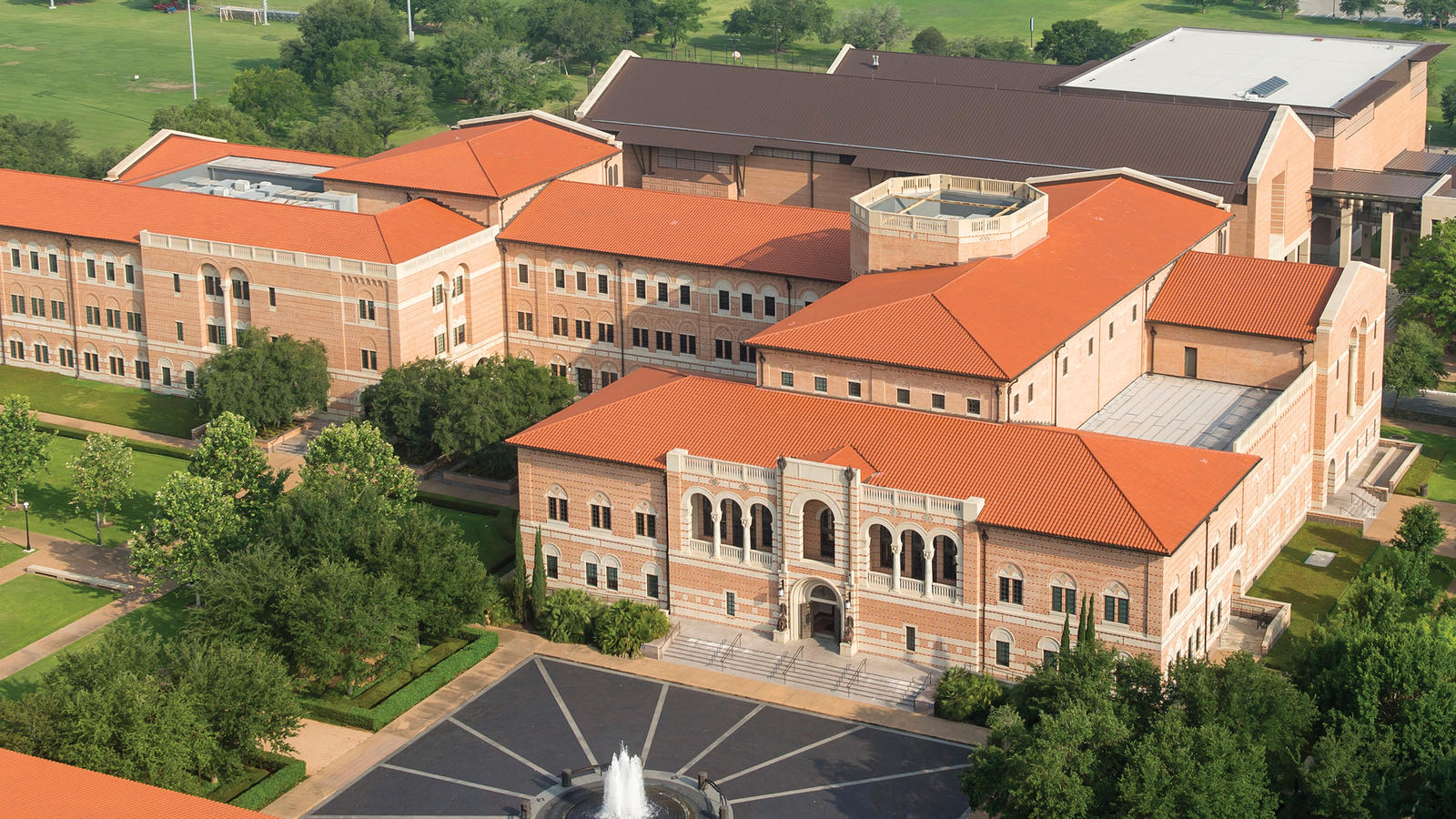
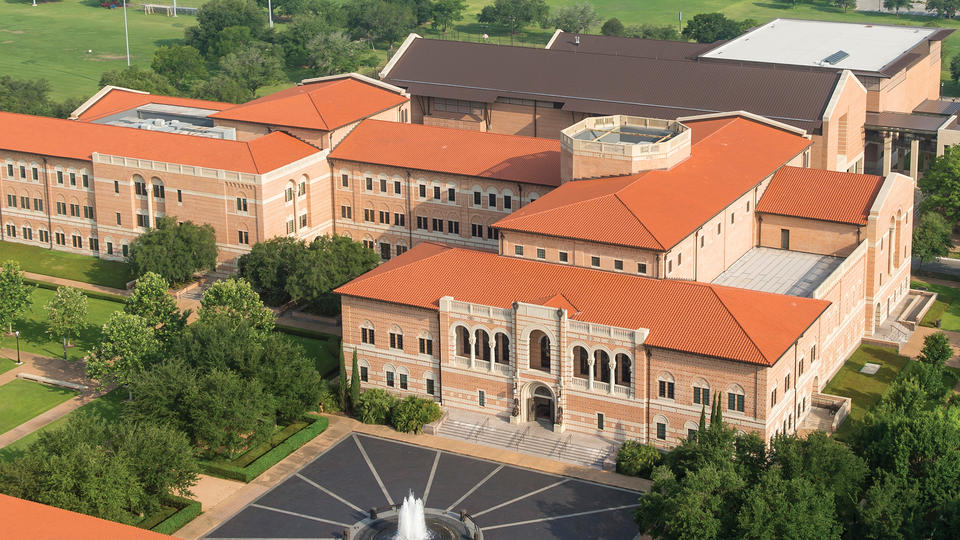
Rice University’s Jones Graduate School of Business jumped ten spots to No. 19 on Bloomberg Businessweek’s full-time MBA ranking for 2023-24.
The ranking places the Rice Business program as the top in Texas and among the nation’s most distinguished, including those at universities such as Yale, Carnegie Mellon, Harvard and the Massachusetts Institute of Technology. Bloomberg Businessweek surveyed students, alumni and recruiters and gathered data provided by the universities to rank schools based on five indexes: compensation after graduation, diversity, learning, networking and entrepreneurship.
The Jones School rose in multiple categories: learning, networking, diversity and entrepreneurship. Rice Business has consistently been ranked among the top graduate entrepreneurship programs in the nation, reflecting the depth and breadth of resources for entrepreneurs during their time at Rice and beyond, school leaders said.
“Rising in the rankings for networking and diversity shows how Rice’s faculty and staff are dedicated to creating an entire environment and ecosystem that benefits our students, not just what happens inside the classroom,” Rice Business Dean Peter Rodriguez said. “I am especially proud of these metrics that highlight Rice’s ability to bring people together.”
The Rice MBA full-time program, which also was recently ranked in the top 20 full-time MBA programs in the U.S. by the Financial Times, provides students with a comprehensive learning experience that combines specialized coursework and real-world experience to improve and amplify their strategy, leadership and critical decision-making credentials. The program features innovative classes, expert faculty and a diverse group of students from all walks of life.
Rice Business is recognized by several publications' rankings for its programs, including the MBA, MBA for Executives and MBA for Professionals. The school is internationally known for the research and thought leadership of its faculty.
To view the complete Bloomberg Businessweek rankings and methodology information, see bloomberg.com/business-schools.
For more information on Rice MBA programs, visit business.rice.edu. For insights from Jones School faculty and their research, visit the school’s Rice Business Wisdom website, ricebusinesswisdom.com.
You May Also Like

Rice University’s Jesse H. Jones Graduate School of Business today announced the launch of its Graduate Certificate in Healthcare Management program, a 10-month, credit-bearing professional credential designed for current and aspiring leaders seeking deep expertise in the business of healthcare.
Cooperation in the U.S. - Mexico Border Region feat. Daniel Gutierrez ’14
Season 3, Episode 25
Daniel joins host Maya Pomroy ’22 in this episode to discuss growing up in Mexico in the 80s and his current role at North American Development Bank and more.
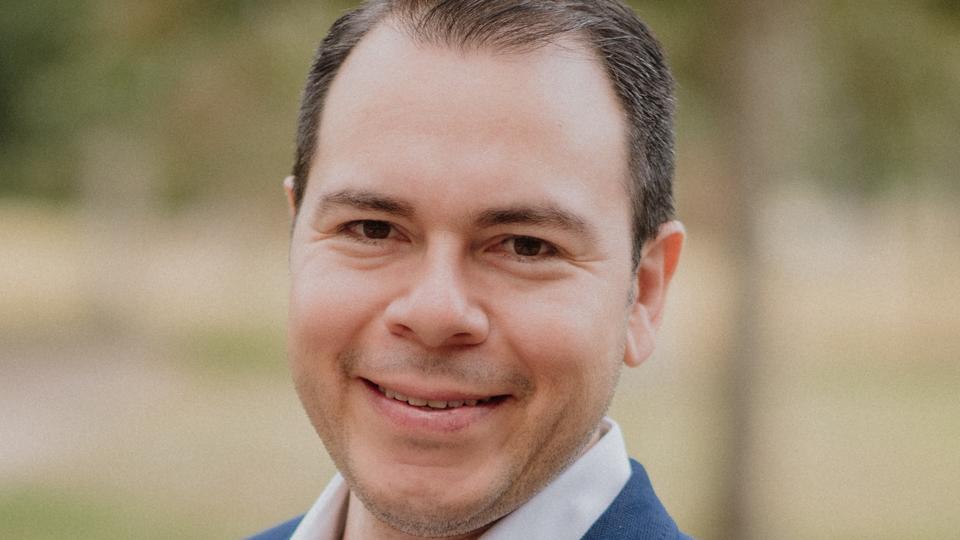
Owl Have You Know
Season 3, Episode 25
Daniel joins host Maya Pomroy ’22 in this episode to discuss growing up in Mexico in the 80s, how going to Rice Business’ Diversity Preview Weekend changed his life path, his current role at North American Development Bank and more.
Subscribe to Owl Have You Know on Apple Podcasts, Spotify, Youtube or wherever you find your favorite podcasts.
Episode Transcript
-
[00:00] Intro: Welcome to Owl Have You Know, a podcast from Rice Business. This episode is part of our Flight Path Series, where guests share their career journeys and stories of the Rice connections that got them where they are.
[00:14] Maya: On today's episode of Owl Have You Know, we connect with Daniel Gutierrez, professional MBA of 2014. Born and raised in Mexico, the finance professional shares his flight path, and what brought him to the U.S., Rice University, and what landed him in his current role at North American Development Bank, a binational financial institutioAn established by the governments of the U.S. and Mexico. We discussed the opportunities and collaborative initiatives between the two countries. Daniel also shares how being an international student at Rice shaped him into the leader that he is today.
Today on Owl Have You Know, our guest is Daniel Gutierrez, professional MBA from the class of 2014. Daniel, thanks for joining us.
[01:01] Daniel: My pleasure, thank you for having me.
[01:03] Maya: Absolutely. So, you were born and raised in Mexico and came to the United States in 2009 for a business opportunity and have decided to stay.
[01:14] Daniel: 13 years and counting, almost.
[01:16] Maya: So, tell me about your childhood and your upbringing in Mexico and what brought you here to the United States.
[01:22] Daniel: Sure. Well, I'm a 1979 model in the, kind of, frontier of Generation X and Generation Y. And I, kind of, cannot identify with a particular generation. I think I have characteristics of both in terms of, like, personality. I grew up in the ‘80s. And during that time in Mexico, we’d learned that the Old Bonanza was over. We thought it was going to be lasting for a long, long time. And it turns out that it wasn't the case. It was a time of decentralization, deregulation, privatization, reforms, the idea of new federalism and the, kind of, glimpse of the country walking into what appeared to be a democracy or the first, kind of, glimpses of that.
It was an interesting time, I think, I remember because we had high inflation, I remember, in 1982, ‘83, when I was like, I don't know, four or five years old. My mother would take me to the groceries and people were, like, relabeling cans of tuna, for instance. And like, I didn't know what was, what was going on. But, you know, it's this inflation, 100% inflation in ’82, I think, and so, on. We didn't have double-digit inflation until like a decade after, I guess.
So, we grew up, in the ‘80s, this generation, especially in Mexico. Somehow, I think, valuing what we had, being content with what we had, it's interesting when I now see a Milky Way bar, for instance.
[02:48] Maya: Yes.
[02:48] Daniel: It was a precious item back then, because we didn't have anything like that when I was raised, right?
So, Mexico entered into the General Agreement on Tariffs and Trade. I think it was in ‘86. So, the economy opened, and then NAFTA after that. That was my childhood growing up in the ‘80s, experiencing huge technological change. If you now think… these new generations think, okay, technological change with, you know, what's happening out there with AI and stuff.
We did live an incredible period of technological change back then. We didn't have internet. You know, you had to actually walk to the TV to change the channel, you know, things like that, that we, sort of, experienced when we were kids.
You’re probably contemporaneous to me, I guess. So, you know what I'm talking about, going to the blockbuster, renting a video, waiting for the return.
[03:36] Maya: Blockbuster, yes, those were the days, the good old days.
[03:41] Daniel: Exactly. So, I'm a big fan of, you know, that type of culture, the pop culture, keep watching those movies over and over again. I cannot get tired. It reminds me of my childhood. And in the ‘90s, I think it was more like NAFTA, economic opening. And then, I decided, okay, I want to be an economist. It was early in my high school years when I decided I wanted to study economics. So, I applied to ITAM, which is a great school in Mexico. It took me a while to figure it out. Flunked calculus 1 three times, I guess.
[04:14] Maya: But you didn't give up.
[04:16] Daniel: No, exactly. And that's so true. And that's part of the story, right? Because I think that the message that I'm trying to bring is, why you want to, you know, pursue an MBA? Or, why you, why me? What is… what makes me special? I think just keep on going, keep trying, keep staying at that effort, right? So, that's what I did in my college years — kept trying. That's one of my big motives that took me through college, that sense of, “I want to do this.” And then, after that, I graduated, I think it was in 2004.
[04:49] Maya: So, let's back up a little bit, the financial crisis, because we remember what the implications of that here in the United States. Can you tell me a little bit about what it was like in Mexico during that time?
[05:01] Daniel: Well, it was experienced in the financial sector, mostly, in the beginning, lack of fundings. When I was working in the municipal and state sector, I think the funding dried out completely. So, many states and municipalities were struggling to fund their current expenditures to be able to afford the maintenance for the infrastructure.
So, it was a challenging time for many states and municipalities in Mexico, and businesses alike. I think many businesses became, you know, bankrupt with lack of funding. Mostly, credit crunch all over the place. And at the time, I think that market certificate insurances were styled for a long time. So, even the ability to fund the long-term, it was completely canceled out.
I remember when I came to the U.S., you could see it everywhere, even worse than in Mexico, I think. The mortgage industry was completely destabilized. But surprisingly, in Texas, you didn't have much of an effect, although there was. But I think the oil, the shale oil boom during that time, sort of, helped cushion the effect a little while. And especially, I think in the city of San Antonio, there was a lot of empty, you know, warehouses, houses that were abandoned, people asking for, you know, help outside of their parking lots. It was, kind of, a shocking experience to me, just recently being, just recently arriving to the U.S.
[06:30] Maya: Wasn't what you expected?
[06:31] Daniel: Yeah. I mean, it was, it was, yeah, definitely surprising, shocking, you know. I got married in 2010, during that transition. So, I came here with my wife and to the state just after a year of being married.
[06:44] Maya: Newlyweds, that must've been fun. Newlyweds in a new, in a new country.
[06:49] Daniel: Being just her and myself living, it was, kind of, a big reset. We didn't bring much of our belongings. We sold everything and just started from scratch after a year of being married. She definitely has been my supporter, you know, starting from scratch. Recent newlyweds, you know, it was a reset for us, with great prospects. We wanted to start our family here and stay for as long as possible in Texas. We really like Texas. It's been our 13th year, I think, this 2023. And we look forward to just keep doing what we do.
Now, we have two kids, a six-year-old girl and a four-year-old boy. They were born here in Texas. So, we now have a family of four and plus our dog that we brought from Mexico. She's an English bulldog. She's 14 years old, and she's still around. She looks like she's half her age.
[07:46] Maya: So, you're in the United States with your dog, your two beautiful children and your wife.
[07:51] Daniel: Yes.
[07:52] Maya: What made you decide to go to business school? So, what was the reason, the catalyst, of why you decided to go to business school? Was it the financial market crisis that you had just watched where you realized that you needed to make a change in your career? Or, what really was the point when you decided, “You know what, I'm going to apply to business school?”
[08:11] Daniel: I think it is that, yeah, I thought some of my colleagues had experienced the MBA before. And I looked up to them, like, as professionals that are, kind of, more rounded, more assembled. Definitely, you could tell that the MBA provided a boost in their career in terms of, not only technical knowledge, but also leadership abilities. I think that was something that called my attention ever since I met people that have done the MBA studies. So, definitely, career advancement, improved business knowledge, global exposure. Not necessarily the one that's probably in Mexico, but definitely, I was looking for another option that provided me with that global exposure, with more diverse cohort, and personal growth in terms of, okay, how can I develop leadership skills that will take me a bit far from where I was?
After that, we decided to come to the States. And the process, sort of, stalled. I began looking for business schools at the time. I think it was 2011, 2012. I did my research for my options that were available to me as a part-time program.
So, I was invited to the Diversity Preview Weekend for Rice the same year. And it, sort of, blew my mind. Even just discussing or meeting the prospective students, you could tell that there were, like, high-caliber students already, or people with, whatever, you know, success-driven, you know, business-oriented.
And we had this small class. I think it was Prashant Kale, the teacher that did the classroom experience to us. And it blew my mind. Prashant was one of my favorite teachers, not to single out anyone, but Prashant is amazing. And then, that made me decide for Rice. Yes, it was further. And I'll tell you how we did it, my wife and myself, it was three-hours-and-a-half drive from San Antonio.
So, I was accepted. I went through the program. I did the GMAT twice because I didn't get the score I needed to, kind of, consider myself with good chances of being accepted. So, I retook it. I got the score I needed. It was a great feeling when I received the letter of acceptance, of course, and then figuring how to finance it, because one thing was, you know, okay, you received a lot of acceptance and then how you finance. We had some savings already built in. And it was, kind of, probably enough to pay a couple of semesters. And my wife, I remember she told me, “You know, we'll figure this out. Don't worry. Let's do this.” That's how the adventure started.
So, she picked me up every Friday. I did the professionals program that happens on Friday and Saturday. I know now they have a hybrid and they have the online program, but I did the professionals program. My cohort had the average of eight years of experience, more or less. It was highly intellectually stimulating to me.
So, she’d pick me up, with our dog, at my office, and we did the driving for three hours and a half, dropped me at school, took our dog to the pet's place, where we left her. And then, we basically booked a hotel for that night and Saturday night.
Now, we did it for two years. I think one thing that kept us going is this Dale Carnegie idea of living in day-tight compartments. In this case, it was living in, couple of weeks, tight compartments, maybe just going to school, focusing more than just what was in front of me, and then going to the classroom, doing the homework, doing whatever was needed. And then, you know, marking one week at a time.
[11:45] Maya: So, that's quite a commitment that you gave to the school, driving back and forth every other weekend with your wife, and really funding this education that has been integral to what you do today. I mean, you know, I think that, if you're talking to other potential candidates who are thinking about Rice, especially from Mexico, what advice, other than just focus on getting in, because obviously that's important, what sort of advice could you give them, the people that are in your shoes, you know, back in 2010?
[12:22] Daniel: Let me go back to talk about what's happening in the Mexico-U.S. border region. The bilateral commerce has gone from $173 billion in ‘94 to $667 billion in 2021. That is a fourfold figure. Reshoring is happening. Nearshoring is happening. Nearsourcing is happening. It's just a matter of time before… or it's already, you know, the real estate prices in the border are already going up by 50%. And there's a scarcity of talent. Who is going to take the lead of those businesses that establish their offices, headquarters, manufacturing facilities on the border?
Nearshoring can go as far as possible without the needed talent, without reliable, efficient, and cheap electricity. So, I think, to build the next generation of leaders in Mexico, I think they really have to think where they want to develop their MBA studies or their studies of where they can learn leadership, all their skills that the MBA program grants, critical thinking abilities, all those skills, that will be needed in the, in the next years, in the next 20, 30 years.
The border region between Mexico and the U.S. is going to become very dynamic. It's probably going to be one of the greatest times to be involved in an MBA program and to use those knowledge to make great things happen in Mexican businesses. With the foreign investments that are coming, think about how the MBA is ranking right now. I was just looking at the Princeton Review recently released rankings. Rice is number one entrepreneurship for the fourth year in a row, number four for the best online program, number five for the best MBA for consulting.
Some of my classmates are fantastic consultants, I believe, because of what we did during our, you know, experience. We were helping an ovarian cancer organization. We ended up winning the Owl Award due to my classmates’ efforts, as well.
[14:22] Maya: It was called Ovarcome.
[14:23] Daniel: Ovarcome, exactly.
[14:24] Maya: So, can you tell me a bit about Ovarcome and what you did during your time at Rice? It was a different classmate that started that organization, correct?
[14:31] Daniel: Yes. Runsi, I think that's her name. We chose Ovarcome because the mother of one of my teammates had passed away recently due to ovarian cancer. So, that was a cause that we really cared about. And then, we really needed to figure out a way for Ovarcome to launch and achieve additional funding, increase the share of mind among donors. And then, we basically build a business plan for Ovarcome at that time. I think that element that we had in the Ovarcome, the skin in the game, we were highly invested, due to the fact that one of us was, had the ovarian cancer, very close in their families.
So, I think that, sort of, helped us push more and offer our all into the consulting process for Ovarcome. And I think the end product was great. We ended up winning the Rice award, the Owl Award, because it was, kind of, an outstanding effort.
I think that one thing that that process taught me is how teamwork can make a difference. So, the importance of teamwork, definitely, was something that I recognize from what was taught to me at Rice. And I still consider teamwork as one of my important elements in my daily working life. The classroom experience that Rice provided me, I remember it was Vikas Mittal that was saying, “Hey, guys, focus on the slope, not the intercept. Don't worry about achieving the highest paying job. Look for an opportunity that offers you the big slope in terms of growth, in terms of opportunities.”
And that has been, I think, in my case, at least, how I have grown professionally — by focusing more on an opportunity that allows me to do something that maybe nobody wants to do, the nitty-gritty stuff, the ‘unknowns’ aspect of the business, and such as the asset management aspect of the business. I took over the asset management department when there was a very little activity. We were basically concentrated in public loans, but then renewable energy projects came into the pipeline.
And then figuring out how to, how to work that asset management side of the business was a fantastic opportunity for me. So, we developed the asset management department at NADBank. I had the opportunity to lead the team, as an interning director for a little while. And now, I'm conducting other efforts as an admin agent and other tasks that are related to asset management as well.
But I think the idea of understanding that there are opportunities when you learn how to look, where to look, that's something that I learned from Rice, you know. Focus on what's important. One of Mittal’s teachings was, constantly, you know, focus on what's important, what the customer cares. And I think that's another important lesson for me during my MBA years.
There was another lesson important from… I think he was Clayton Christensen, a book on how will you measure your life, the idea of being aware of the slippery slopes and how can a slippery slope take you through an outcome that you may not want. So, be careful about those slippery slopes. Ethics matter. So, always be mindful of the slippery slopes.
[17:41] Maya: Well, those are, those are wonderful lessons. And one of the things that I did want to discuss with you is your role as the associate director of asset management for North American Development Bank, which was a cooperation between the United States and Mexico. And you talked about teamwork, right? And about, you know, they say teamwork makes the dream work, right? That little cheesy line. But, you know, it's challenging right now on the border between the United States and Mexico. And what do you think are the biggest misunderstandings in the region? What do you wish that people knew more about?
[18:16] Daniel: First of all, I think that binational coordination works, regardless of what you hear in the news. And NADBank is a testament for that. I think NADBank has shown that two countries can cooperate with the complexities that are between, you know: water, rights, water shared rights, immigration agenda. There's a bunch of other things that are not necessarily related to the funding of environmental projects.
But the environmental impact and taking care of the environment is something that NADBank is doing, as we speak, understanding how the new challenges ahead with the nearshoring, reshoring will bring the environment along the U.S.-Mexico border in terms of water usage, in terms of pollution that is coming from the drainage in cities, such as, you know, Tijuana, the security issues along the border as well.
And there are so many different topics that are out there. But I've come to understand that the binational corporation does exist. And maybe it’s not there in the news for many reasons, but somehow it, sort of, works.
And then, as an, as an example, we just had a meeting with the three presidents of, you know, U.S., Canada, and Mexico a few weeks ago in Mexico City. And they were discussing what to do with this, you know, huge appetite for investments in the border region and in other parts of the country. You can see housing market for foreign citizens taking off in many areas of the country. So, people are definitely considering Mexico as a retirement. And you think about all those baby boomers that are starting to, you know, think about retiring, and then the new other generations that will retire in the next, you know, 20, 30 years.
I think Mexico is becoming an interesting place to invest in terms of, like, housing. There are beautiful places to consider as a second home, as a, you know, retirement home. And that is taking off in many areas. You can see the Mayan Riviera, Yucatan Peninsula, Baja California, areas that you, 10 years ago, you would never thought about, like, people from the States establishing their homestead there.
Well, now, it's happening. And yes, there are news about, you know, insecurity or, you know, drug activity, but those are very focalized. And when you hear about that in the news, it seems like it's all over the place. Well, there are very focalized areas where that is happening. And I think, yes, there are challenges, and in the next decade there will be more, but the international cooperation between U.S. and Mexico will, you know, is going to continue. That is my expectation.
[20:54] Maya: And so, what are some of your goals for the future in the next five to 10 years? What do you, what are you working on next that you're excited about that you want to share with us?
[21:01] Daniel: I'm really excited about the applications for artificial intelligence. I've been playing with ChatGPT in the past few weeks, and I'm, you know, ecstatic of what you can do with that thing. Applications, you know, AI applications of all sorts, and how that is going to integrate in our, in our lives, professionally and personally.
Many people are questioning, hey, you know, when is this going to happen? And, you know, technological change has been there, you know, forever. This is, probably, a new curve that we're going to live. I'm excited about all that, kind of, wave of artificial intelligence that's coming up and reading every debate, copyright issues, schools that are worried that students will use that technology to present their essay, stuff like that. But the real discussion is, how are we going to train the next generation to use or to leverage this technology for the betterment of human being, for the betterment of humanity?
It's… it is a double-edged sword, perhaps, as maybe Elon Musk has alerted. But I think that singularity, when they talk about AI, sort of, becomes more cautious. It's just, maybe, going to happen eventually. And what are we going to do about it? All those discussions, I'm following them. And the marvel of the capacity in this very early stage of artificial intelligence.
I'm also interested in expanding more globally in terms of what's out there in, you know, Asia, what's out there in Europe, in Africa. If you look at the population pyramids, the most promising ones are in Africa. In China, not as much, but I think Africa, countries that are actually shaped as a pyramid, they're now less and less. And Africa offers a very promising place for foreign direct investments, for, you know, partnerships, investments like human capital investments, the evolution of solar, the evolution of wind energy, renewable, taking care of the environment, that's just here to stay. I think it's just a matter of time where we continue to see more investments in renewable energy in many areas. There's resource, of course, but now maybe coupled with the energy storage. So, you're going to see a lot of solar-plus-storage happening, perhaps, more in California, perhaps, in Texas, due to the need to get a more reliable network.
And I think I'm very bullish in terms of the prospects for storage in the next five to 10 years, maybe not only in the U.S. but also in other countries. I think Mexico is also recognizing the importance of renewable energy. Despite the setbacks that we had in the past few years, I'm also very positive that, in the next two to five years, we're going to see more projects becoming, at least starting… you see developers starting to look at the sector for the next two to five years. So, I think we should also keep looking at the sector, regardless of the public policy situation right now in Mexico.
[24:08] Maya: So, lots of, lots of exciting things ahead.
[24:10] Daniel: Hopefully, yes.
[24:12] Maya: Lots of things to look forward to. Well, Daniel, thank you. Thank you so much for your time today. It was, it was a pleasure talking with you.
[24:18] Daniel: Likewise.
[24:19] Maya: And we'd love to stay in touch, you know, next couple of years. We'll see where your path takes you.
[24:24] Daniel: Thank you, Maya. Thank you for your time today. It was a pleasure.
[24:29] Maya: Thanks for listening. This has been Owl Have You Know, a production of Rice Business. You can find more information about our guests, hosts, and announcements on our website, business.rice.edu. Please subscribe and leave a rating, wherever you find your podcasts. We’d love to hear what you think. The hosts of Owl Have You Know are myself, Maya Pomroy, and Scott Gale.
You May Also Like
Harvard & Wharton Slump In New 2023 Businessweek MBA Ranking
Bloomberg Businessweek has ranked the Rice Business full-time MBA program No. 19 — rising ten spots from last year.
